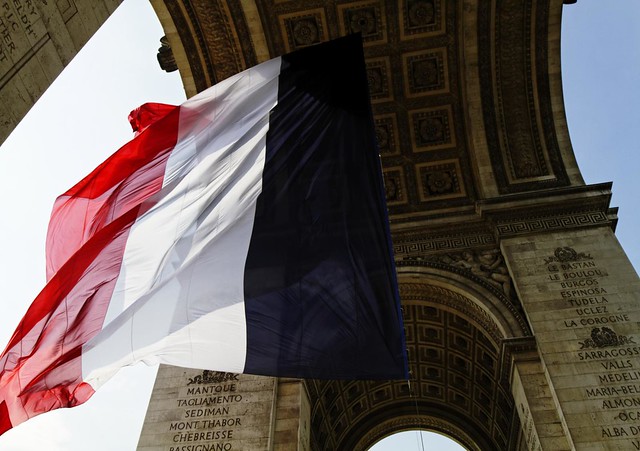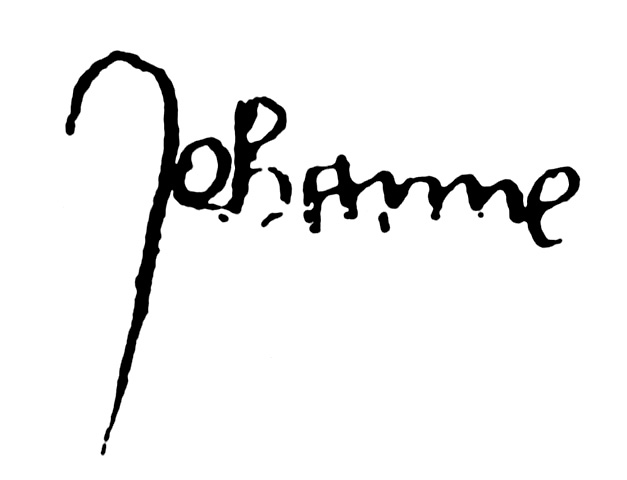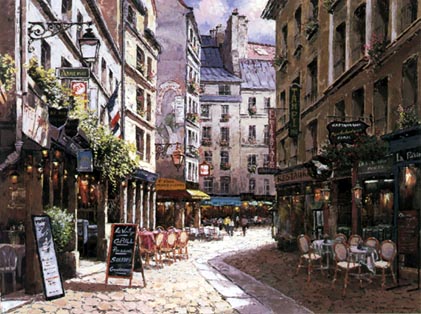Le Republique Francaise: Liberté – Égalité – Fraternité
These are three values not to be ignored in France: Liberty - Equality - Brotherhood. I think these are probably the values France has ideally held onto most since the French Revolution.
Le drapeau tricolore sous l'arc de triomphe; I have yet to find out why exactly this is done, but it is most certainly a sign of nationalism and it can be seen from so many places within the city.
Fleur-de-lis on the coat of arms of France from ancient times. Harks back to ancient France, that history and the "legacy" involved.
Lady Liberty - Marianne is an important symbol of France, here she leads men into one of the Revolutions France underwent during the 16th-19th centuries.
Notre Dame, made famous by Victor Hugo after being more or less abandoned after the French Revolution. A sign of Catholicism in France, but also a National symbol of Gothic architecture.
Blue Virgin Window at Chatres Cathedral - survived from the Romanesque Cathedral after Chartes burned down several times; the Cathedral was not looted during the French Revolution, neither was it destroyed during either of the World Wars. Once contained the shroud of Mary, given to Charlemagne as a gift from Jerusalem.
Reims Cathedral where the Kings of France--starting with Clovis--were coronated. This is the third Cathedral on the site, from the 13th century; the cathedral was made bigger for the crowds that would come to coronations.
Joan d'Arc has been a consistent symbol in France, her story being used by everyone from Liberals to conservatives, to the Vichy Regime to French Resistance fighters.
Her signature - 'Jehanne' or 'Johanne' (I just thought this was awesome.)
In all honesty, when we visited the 'Beauty and Belief' exhibit, and we were asked about symbols from our Field Study sites, I had no idea what to say about France. It didn't take me long when I really started thinking about it, but it did take me a little time to find out why France used some of these symbols to represent their values, ideals, or history.
There's a lot of nationalism in France, a lot of pride for being French and a LOT of history that gets them to those ideals, values and pride. This doesn't really surprise me. There are a lot of things not to be proud of in any country's history, but there's so much more to recognize in France as 'legacy.' Marianne, France's equivalent to our 'Columbia' or Britain's 'Britannia' is the female personification of France, she is valiant and courageous, she is loyal and she is fiercely behind France and its ideals. She, like Athena, is a warrior, ready to fight if necessary.
French history is also very important, and because of a rocky past, I think the French are big on ideals. I think Americans are, too, so maybe that's something we can understand about each other. The difference is the way we interpret or show those ideals, which is something I don't think we always understand about each other. But in general, the French choose to remember about their history, the things that make them proud of that history, and I think that's par for the course for any country's national memory. For France, this includes the Cathedrals, even though so much of France are no longer practicing Catholics; this includes Joan d'Arc, even though the French handed her over to the English to be executed. This includes the values of the French Revolution: Liberté – Égalité – Fraternité, even though those ideals came at such a high cost. It is interesting that sometimes a culture's most valued ideals are born out of their darkest moments, perhaps when they realize they need them most.
There's a lot of nationalism in France, a lot of pride for being French and a LOT of history that gets them to those ideals, values and pride. This doesn't really surprise me. There are a lot of things not to be proud of in any country's history, but there's so much more to recognize in France as 'legacy.' Marianne, France's equivalent to our 'Columbia' or Britain's 'Britannia' is the female personification of France, she is valiant and courageous, she is loyal and she is fiercely behind France and its ideals. She, like Athena, is a warrior, ready to fight if necessary.
French history is also very important, and because of a rocky past, I think the French are big on ideals. I think Americans are, too, so maybe that's something we can understand about each other. The difference is the way we interpret or show those ideals, which is something I don't think we always understand about each other. But in general, the French choose to remember about their history, the things that make them proud of that history, and I think that's par for the course for any country's national memory. For France, this includes the Cathedrals, even though so much of France are no longer practicing Catholics; this includes Joan d'Arc, even though the French handed her over to the English to be executed. This includes the values of the French Revolution: Liberté – Égalité – Fraternité, even though those ideals came at such a high cost. It is interesting that sometimes a culture's most valued ideals are born out of their darkest moments, perhaps when they realize they need them most.
Charles de Gaulle - Regarded as the leader of the Resistance and 'savior' of France after WWII; in reality the history isn't that simple.
Terrein - see my post on Terrein, and the value of 'mon pays.'
The French Resistance during WWII was regarded as being widespread and entirely influential of the eventual dispelling of Germans from France, in reality, most French were not part of the Resistance throughout the occupation.
La rue - Community, and small shops; "small town life" is still important in France, even in big cities. There is a lot of value put on what we would call 'Mom and Pop shops' or bakeries, and having places you frequent.
Conversation. Need I say more? The French will make reservations at a restaurant, and once the restaurant fills there is not 'wait' because guests are expected to stay until the close of the restaurant--doing what? Talking. I was born for this place.
Not all values are based off of history, though they are usually based in history. One such value is the value of mon pays--where someone is from. I think this comes from a long line of defining oneself as not 'French' necessarily but a Parisien or a Poitevin or a -- no, I'm not going to play this game. Take a gander at this website which is awesome: (http://www.habitants.fr/index.php). My point is, ultimately, that there's something to defining yourself against the land you've lived in, rather than the nation constructed around that land.
Furthermore, where did the French get their love for their language?
Acadamie francaise - it's main reason for being is to preserve the French language. I like to think that this is why direct translations of the French language into English sound like old English--or how we USED to speak, and don't anymore. Without Academie Francaise, I wonder what French would sound like.
The French are profoundly attached to and proud of their language, I think the existence of the Academie Francaise more or less proves that. We don't have an English Academy making sure we Americans don't ruin the good language of English--though, I'm fairly certain the English DO think we've ruined their language. The point is, we don't have one. We might learn about old English, but that's just the point--it's old. I'm not sure if the love of talking and conversing about anything and everything is where this pride of language came from, but maybe that's something I'll have to ask.
So how will knowing these symbols help me on my Field Study? Well, there's something to knowing these values exist, and that they're different from our own. I think there's something else to knowing the basics so that when you get to your chosen country of study you're not always asking the 'What is that?' question, but asking the 'Why is that?' question. We waste a lot of time asking, 'What is that?' when the really interesting part is finding out "Why is that?" because that is where, in my opinion, the culture is found.














No comments:
Post a Comment